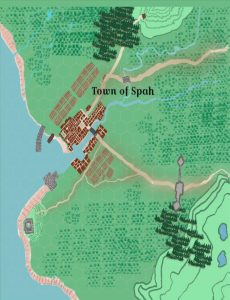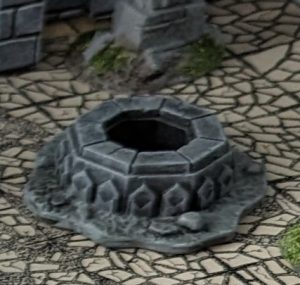The group had travelled many miles from their base in Eshtaband, as one of their number, a man frozen in time for 1500 years called Smersh, was given a tablet granting rulership of a small estate granted to a child he did not know he had had, and the line descending from there. Once they established the current names of the places named, and where they were, they set off.
Standing in the Council Chamber of Spah, as the Council deliberate over the news that Smersh has in his possession a bronze tablet that, on the face of it, confers ownership of the area to Smersh. The Council took the word of Utana, as a noble of the realm, as to the genuine as of the claim of Smersh to be the heir of the last two of the line, Payam and Shaya. (at least until word could be received back from a messenger sent to the capital), though they were confused as to the relationship between Smersh and the last of the line of Spionem, first lord of the lands around what is now the town of Spah.
As the Council consider the issues, with legal advice to the priest, and talk to each other in hushed tones, the group recall a couple of incidents as the ship left to carry them south.,
Firstly the news that the shapechanging Pale Folk had escaped captivity. The group did not press the matter, no doubt stunned by this revelation.
Secondly, as their ship was making way, a group of burly individuals ran to the dog, shouting and gesticulating wildly. Fetnah sent no spirits, Farshad kept Aribu close, at her than sending the crow sinulacrum forth, so they were reliant on the words that Utana’s sharp ears could catch.
“Jalabu, you something,something renegade, come something,Hamid demands an accounting, and wants signs something you will repay him. Come back you get of a something goat, BEG for something mercy!”.
There is more to revisit, but the player was absent, so next time, next time.
The Council finish their deliberations, and the leader, Debra, address the group. Stripped of polite circumlocutions and excess verbiage, the substantial points amounted to this
- The realm of Bakhdin that granted these lands, Bakhdin, no longer exists.
- First it fell to civil war, then invasion by the Mada (Utana’s folk) and then the Parsuma. Utana speculated audibly that perhaps this means that the estate should be his.
- Over the centuries the family divested itself of land and responsibilities, trading and selling them
- The last two members of the family, Payam and his daughter Shaya, last of the line, were noted alchemists, but reclusive and not much involved in the affairs of the town
- There are still properties owned, and a factor who takes responsibility for the estate, and a new mine from which you will earn some royalties when it starts running.
 There was, one other issue. There is an estate, but no one goes there any more as it is haunted, to which Smersh exclaimed “Of course it is”.
There was, one other issue. There is an estate, but no one goes there any more as it is haunted, to which Smersh exclaimed “Of course it is”.
Some enquiries about any knowledge of the place fell short. The group were stunned that the house of the estate was not the frequent haunt of mischievous children, despite it being a few miles outside town through a marsh, though there was a recollection that Parmuz the Hermit had gone there a few years ago, and come back frightened, and the oldest Council member, Aruch the Hunter recalled a messenger who had spoken of the house being a storehouse of tablets, scrolls, books and other, expensive signs of learning..
No one else goes there, but there was a memory that a hermit, by the name of Parmuz, had been there a few years ago, and had seemed frightened. The oldest member of the council, Aruch remembered that, in his childhood, a messenger had come, and reported that the house seemed full of tablets, scrolls and books of papyri, evidence either of money, or an ancient family.
The group decided to talk to Parmuz, to see if he could provide any information, but first to the factor, so that Smersh could get an accounting. The offices were well situated, in the centre of the town, and the group found the factor and two scribes hard at work with an exchequer board.
Smersh introduced himself top the factor, Afhaq, and produced the tablet. Shocked, she went into an inner office to produce a copy, the foundation document of the estate. Smersh appointed Farshad as his auditor, as the only one with the skills, and a set of books were promised by the end of the week. This prompted some questions by Afhaq, who had heard of a Shevam swindler by the name of Farshad, who has cornered the market in the output of a fishing fleet and sold its catch, only for it to turn out that the fleet, and therefore the fish, were purely imaginary.
Reassured that this Farshad was not the same one, Smersh’s requests for some “walking around money” though, as the person responsible for accounting estate spending, she also took Smersh’s mark as authorisation.
From there to Parmuz, who lived the life of a solitary fisherman in the marshes of the north. Utana’s experience of deserts and mountains, and Fetnah’s of long vanished forests, was not helpful in avoiding some of the pitfalls of travelling in marshlands, but eventually they found his hut. The hermit’s information was limited, even after his tongue was loosened by some drink, and some silver for more. Seeking any signs of wine or spirits to survive the years in the wine cellar, he made his way in through the rear garden entrance, he was only a little way in before he was terrified by the screams and howling of the restless dead, and eerie lights, somehow sickly and unsettling.
Parmuz was able to at least start the group on a dry way back to town, and at the factor’s Smersh ask the factor if they could help supply water for washing and a change of clothes, food and accommodation. More authorisation and bafflement from Smersh, and it has to be said Utana, who kind of thought the wealthy just got stuff. The notion that even if belonging to their own household, stuff had to be paid for had to be paid for somehow, mystified the pair. The hour now being late, the group retired for the night.
The group bustled about in the morning, and a groggy Smersh awoke to find his thumbprint being pressed into more tablets as supplies were brought in, and their worth tallied by a diligent scribe, no doubt to be part of the audit soon to be undertaken by Farshad. (look forward to a no hold’s barred adventure based around double entry book keeping, account reconciliation and, of course, the Sederunt! – Perhaps Farshad will put it to song).
Refreshed, fed and dressed, the group set off to the estate, a few miles south of town, along a little used road through the marshes. Initially followed by the mischievous and inquisitive children that the group had expected earlier, when the wall of the estate could be seen over the reeds, the children looked scared, and backed off, and then ran home.
With comments about the group needing a Great Dane and something about “meddling kids”, the group proceeded on, up the hill and to inspect the dilapidated wall. The gates were locked and they never thought to try picking it, or climbing it, at least not seriously, instead they wandered around the walls until they found a part where the wall had collapsed enough to make entry easy.
The house behind the wall seemed particularly dilapidated, plaster peeling, stone work. Utana, with his educated eye, spotted a variety of architectural styles in the house,noted the use of more expensive stone rather than brick, though perhaps the damper climate accounted for that, but this house had grown and been rebuilt over the centuries.
This brought them to a patch of garden, long run wild to the point that it might have been mistaken for weeds. but Fetnah and José Juan became excited when they not only identified medicinal herbs, but also some hybrids previously unknown to them. Quelling their excitement, they proceeded with the rest of group to investigate a covered well. That proved to be well made, the stones free of slime and the water still clear, and the light above seemed to show some sparkling items at the bottom. Smersh volunteered to go down but Utana, ever the traditionalist, insisted than any unknown, dark and forbidding depths should be investigated by dangling Farshad on the end of a rope.
 Borrowing the absent Jalabu’s magic shield as a light source, Farshad went down and saw that the water was fresh and clear, the bottom of the well seemed to be fed by a stream passing through it. The shiny objects were ancient silver coins, the designs unfamiliar, and Farshad gathered as many as he could (37) before he had to be pulled up, as he had attracted the attention of a water-snake.
Borrowing the absent Jalabu’s magic shield as a light source, Farshad went down and saw that the water was fresh and clear, the bottom of the well seemed to be fed by a stream passing through it. The shiny objects were ancient silver coins, the designs unfamiliar, and Farshad gathered as many as he could (37) before he had to be pulled up, as he had attracted the attention of a water-snake.
With a sopping Farshad in tow, him tucking the coins into one if his many pouches, they made their way to the door, which, although locked, made way under the combined force of Farshad and Smersh. That will be another debit on Smersh’s accounts.
The found themselves in a typical waiting room, though the frescoes were peeling and some of the benches and one of the low tables were broken. Fetnah and Utana spotted two sets of tracks, made it looked by a mortal, one set going straight ahead, the other heading left.
And there we left it (mostly because I had drawn the map on another computer and not uploaded it to the VTT).
